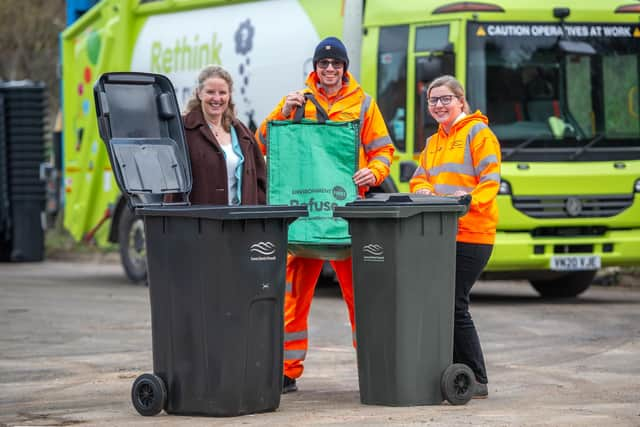Council urges Lewes District residents to check bin calendar for new collection days
and live on Freeview channel 276
Every home will receive a calendar in the post in a Lewes District Council envelope by the end of February.
The A5 calendars are a schedule of recycling, food waste and general household refuse collections from March 2024 through February 2025, including all the adjustments for Easter, Bank Holidays and the festive season.
Advertisement
Hide AdAdvertisement
Hide AdThe days and times for recycling, food and general waste collection will change for the majority of households starting the week commencing Monday, March 4, following a comprehensive review of all the district’s refuse collection rounds. The new rounds will improve efficiency and make best use of the council’s electric vehicle fleet.


Councillor Wendy Maples, Cabinet Member for Neighbourhood Wellbeing, said: “The review has been a major piece of work, so much so that four out of five households will see their bin collection days and/or times change, starting from March 4th. I ask everyone to look at their new calendar to check for those changes and to keep it in a handy place for easy reference throughout the year.”
The frequency of collections will stay the same, with refuse and food waste being collected weekly and recycling collected fortnightly. The calendars will arrive with a letter explaining the changes and the council is also putting notices on residents’ bins during February as a further reminder. Residents should be aware that collection times as well as collection days may be different. As always, all bins must be put out kerbside by 6am on the correct day.
In addition, the council is starting to introduce wheeled bin refuse collections across Lewes district.
Advertisement
Hide AdAdvertisement
Hide AdNew refuse bins are free to Lewes district residents and people have a choice of three different bin options, including an easier to move 140-litre slim-line bin or a gull-proof sack for those with limited space to store a bin or narrow pavements outside their home.
Councillor Maples said: “The wheelie bins are 98% recycled and much more robust to attacks from gulls and other animals than black sacks so will reduce litter on our roads and pavements. They are also a significantly safer option for our waste crews, reducing the risk of injuries.”
The wheelie bin roll out is taking place in phases: rural areas – including Barcombe, Ditchling, Ringmer and Chailey – are in phase one in February/March, followed by coastal areas, starting from Newhaven to Saltdean, are phase two in the spring. South Heighton, Bishopstone and Seaford are in phase three, followed by central parts of the district, including Lewes town and the remaining villages, in phase four in the summer.
People who have purchased a refuse wheelie bin from Lewes District Council are welcome to keep using it and do not need to do anything – the council will not deliver another bin to their property unless a replacement is requested.
Advertisement
Hide AdAdvertisement
Hide AdThose who do not have an LDC-issued refuse bin will have one delivered to their home. Residents do not have to be in to receive their free bin. These residents just need to let the council know what size bin they prefer by visiting lewes-eastbourne.gov.uk/wheeliebins.
If a request for a particular bin is not made, the council will deliver a wheelie bin appropriate for that home during the area’s phase of the roll-out.
All non-LDC-issued refuse wheelie bins will need to be replaced with a new bin. This is to guarantee the safety of waste operatives when the bins are attached, lifted and emptied into waste collection vehicles. This requires a standardised bin design.
Residents can choose to keep, repurpose or recycle any non-LDC refuse bins.
Advertisement
Hide AdAdvertisement
Hide AdThe council will also remove old bins and either donate them to groups for reuse or have them recycled into new bins. This can be requested via the wheelie bins web page. Also on this webpage is a short video explaining the changes.
Additionally, an online A-Z guide of how to reduce, reuse and recycle can be used if you are unsure what to do with a particular item. Visit lewes-eastbourne.gov.uk/wasteAtoZ